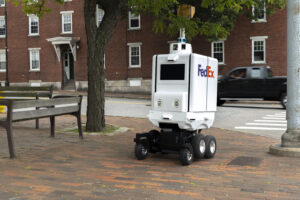Trevor Hoyle, Senior VP of Ground Operations of FedEx, blogs about the COVID-19 pandemic and the permanent, profound changes for society. Attitudes towards home working have changed. Some businesses are moving towards 100% home working. The role of technology will be more dominant, as modern communications have shown what is possible despite physical social distancing.
Sustainable cities
The pandemic has also put new life into the sustainability debate. According to the International Energy Agency, the impact of the pandemic has been so significant that 8% of the estimated total CO2-emissions for the year, will never be emitted into the atmosphere. Accounting for 80% of global greenhouse gas emissions, many cities, are looking at economic recovery through a sustainability lens.
Amsterdam is designing a post-COVID-19 future based around the so-called ‘doughnut model’, and aims to make the city’s economy fully circular by 2050. In Milan, officials are resisting a return to pre-COVID-19 traffic emissions, announcing the transformation of 35 km of streets into citywide cycling and walking spaces. In the UK, Scottish authorities have announced £10m to create pop-up walking and cycling lanes, and a number of boroughs in London have announced plans to widen pavements, close roads, and improve walking and cycling.
The logistics industry
Trevor Hoyle: “It is critical that the logistics industry plays a role in designing this sustainable recovery – and it has never been a better time to bring our expertise to the table. The fight to contain COVID-19 has relied on the free and frictionless flow of critical goods such as medical supplies, PPE, masks, testing kits, and ventilators. These goods are often shipped across continents and into our urban spaces, sometimes in carefully temperature-controlled conditions, requiring capabilities that were simply not on people’s radars in normal times. Furthermore, more people at home has led to a surge in demand for goods delivered to people’s doorsteps. People had expectations about fast, reliable delivery of goods before the global lockdown. This expectation has only strengthened in recent months. The criticality of logistics has taken center stage in our lives. We should use this opportunity to encourage stronger collaboration between those designing our future cities”.
Infrastructure for city logistics
Trevor Hoyle talks about the historic movement of logistics infrastructure out of our cities: “For decades, ‘logistics sprawl’ has been driven by land scarcity and the search for economies of scale. Ever-larger regional, national and European warehouses have moved further away from city centers (since 1970 the average distance between warehouses and Paris city center has almost tripled), and this could accelerate as cities plot a more sustainable future. Greater distances mean more vehicle miles on the road and higher emissions. Furthermore, bringing logistics closer to the heart of the city makes it easier for transportation companies to electrify fleets, as the infrastructure is superior and vehicles can cover the necessary distances. Finally, a tightening of logistics infrastructure around the city allows for greater experimentation and the use of different solutions to complete the last mile, including cargo bikes”.
Bringing logistics closer to the city requires a change in thinking. Logistics infrastructure would need considering in urban planning decisions earlier. Land prices would need addressing. Logistics operators, need to think innovatively about working together This requires closer collaboration between industry, policy-makers, urban planning authorities, real estate experts, and even architecture professionals.
Balance the health of our cities with the wealth of our cities
Trevor Hoyle: “Cities are the engines of economic growth, and as the world rebuilds after the COVID-19 pandemic we need them to thrive again. How we do this in a sustainable way is a huge challenge. Logistics are the arteries of trade, and if there is one thing we’ve learned in the last few months it is that we have an important role to play”.
Source: Eddie
Photo: FedEx press

